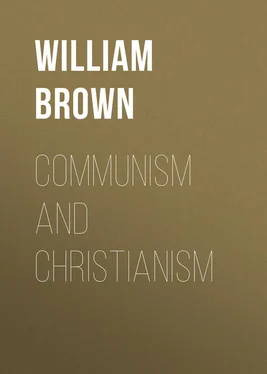William Brown - Communism and Christianism
Здесь есть возможность читать онлайн «William Brown - Communism and Christianism» — ознакомительный отрывок электронной книги совершенно бесплатно, а после прочтения отрывка купить полную версию. В некоторых случаях можно слушать аудио, скачать через торрент в формате fb2 и присутствует краткое содержание. ISBN: , Жанр: foreign_antique, foreign_prose, на английском языке. Описание произведения, (предисловие) а так же отзывы посетителей доступны на портале библиотеки ЛибКат.
- Название:Communism and Christianism
- Автор:
- Жанр:
- Год:неизвестен
- ISBN:http://www.gutenberg.org/ebooks/30758
- Рейтинг книги:3 / 5. Голосов: 1
-
Избранное:Добавить в избранное
- Отзывы:
-
Ваша оценка:
- 60
- 1
- 2
- 3
- 4
- 5
Communism and Christianism: краткое содержание, описание и аннотация
Предлагаем к чтению аннотацию, описание, краткое содержание или предисловие (зависит от того, что написал сам автор книги «Communism and Christianism»). Если вы не нашли необходимую информацию о книге — напишите в комментариях, мы постараемся отыскать её.
Communism and Christianism — читать онлайн ознакомительный отрывок
Ниже представлен текст книги, разбитый по страницам. Система сохранения места последней прочитанной страницы, позволяет с удобством читать онлайн бесплатно книгу «Communism and Christianism», без необходимости каждый раз заново искать на чём Вы остановились. Поставьте закладку, и сможете в любой момент перейти на страницу, на которой закончили чтение.
Интервал:
Закладка:
The difference between Romanism and Protestantism is not at all a question of relative supernaturalism, nor of rightness and wrongness, but wholly one of the difference between the systems of economics which gave them birth.
If you ask, is not this difference at least partly a question of the age in which they took their rise, I reply, yes; but the age itself depends upon the system.
However, it is a fact that while an economic system does constitute the foundation of every religious and political superstructure, yet below the foundation itself there is always a bed rock upon which it ultimately rests, and this is a question of machinery by which the necessities of life are produced and distributed.
The age of feudalism was essentially traditional or theoretical in its character.
The age of capitalism is essentially scientific or experimental in its character.
This difference between these ages is due to the fact that during the earlier age things were made with hand tools, and during the later one with machine tools.
Machinery in a theoretical or traditional age would be an anachronism. It must have an experimental or scientific age for its development, and, paradoxical as it may seem, this the machinery must make for itself. Every period in human history has had its determining character from the tools which brought it into being.
Supernaturalism has no place in the observations, investigations or experimentations which are necessary to the invention, construction and operation of a great machine and, hence, the machines have banished the gods from the roof of the earth and the devils from its cellar, leaving it to us to make of it what we please, a heaven or a hell without reference to them. In his brilliant work entitled "Social and Philosophical Studies", translated by Charles H. Kerr, Paul Lafargue writes:
The labour of the mechanical factory puts the wage-worker in touch with terrible natural forces unknown to the peasant, but instead of being mastered by them he controls them. The gigantic mechanism of iron and steel which fills the factory, which makes him move like an automaton, which sometimes clutches him, bruises him, mutilates him, does not engender in him a superstitious terror as the thunder does in the peasant, but leaves him unmoved, for he knows that the limbs of the mechanical monster were fashioned and mounted by his comrades, and that he has but to push a lever to set it in motion or stop it. The machine, in spite of its miraculous power and productiveness, has no mystery for him. The labourer in the electrical works, who has but to turn a crank on a dial to send miles of motive power to tramways, or light the lamps of a city, has but to say, like the God of Genesis, "let there be light," and there is light. Never sorcery more fantastic was imagined, yet for him this sorcery is a simple and natural thing. He would be greatly surprised if one were to come and tell him that a certain god might, if he chose, stop the machines and extinguish the lights when the electricity had been turned on; he would reply that this anarchistic god would be simply a misplaced gearing or a broken wire, and that it would be easy for him to seek and find this disturbing god. The practice of the modern factory teaches scientific determinism to the wage-worker, without it being necessary for him to pass through the theoretic study of the sciences.
Earth must be a hell as long as we allow the capitalist system to continue on it and to enslave the vast majority of its inhabitants. Marxian socialism will ring out the old era with its hell of human slavery and ring in the new era with its heaven of machine slavery.
One point must be grasped and held by all who would understand the changes which take place within the social realm and it is this: they are due to the differences in the instrumentalities or machines by which the necessities of life are produced.
Man has risen above the lower animals which have common ancestors with his own, because of the superiority of the hand by which he does things to the hands by which they do things. If a man's body in general and hand in particular were not a great improvement over the bodies and hands of the apes, his mind and morality would differ but little from theirs.
The superiority of the civilization of this age over its predecessors is a question of instrumentalities by which the efficiency of the hand is increased.
If all the modern machinery were taken from this generation and replaced by the implements of the stone age the civilization of the next generation would begin to sink, and within a century it would reach the ancient level.
Strong expression is also given to the great truth upon which we are here dwelling by the Socialist Party of Great Britain in its noteworthy Manifesto:
Obviously, in order that there may be ideas and human history, two material things must first be present: human beings, and food and shelter for them. And the fundamental fact that is so seldom realized is, that where, by what means, and how much, food and shelter can be obtained, determines if, where, and how, man shall live, and the forms his social institutions and ideas shall take.
It is, indeed, the very basis of Socialist philosophy that, in the words of Frederick Engels:
"In every historical epoch the prevailing mode of economic production and exchange, and the social organization necessarily following from it, form the basis upon which is built up, and from which, alone can be explained, the political and intellectual history of that epoch."
This materialist concept is the Socialist key to history. It is the first principle of a science of society, and, being directly antagonistic to all religious philosophy, it is destined to drive this "philosophy" and all its superstitions from their last ditch.
Civilization will not die with the death of the capitalist system of production any more than it did with the feudal system. It improved under capitalism, because of the improvement in the machinery of production, and it is destined to continue its progress so long as new and better machines are made and this will be to the end.
Marxian socialism is a machine optimism. Under this socialism the number and efficiency of machines would increase more rapidly than they have under capitalism and feudalism, because its aim will be the production of commodities for use within the shortest time by the least exertion at the slightest risk of injury.
Up to the point of over production, that is, of glutting the markets, it is to the interest of capitalism to encourage improvements in machinery, but the ability to do this has been reached, as is evident from what we hear at increasingly frequent intervals about an over production of commodities.
What machinery we now have renders it possible to produce more commodities than can be sold without employing all the labor power. But the idle, starving slave is a danger to the idle, surfeiting master. Hence, under capitalism there can be no further development of machinery, at least not on a large scale.
An industrial government would have for its aim to produce enough of everything for all with the least expenditure of energy and time. Hence, the greatest benefactors and heroes under socialism would be the inventors of labor saving, leisure giving machinery.
We hear much about the mental superiority of the representatives of the master class over those of the slave class, but there is little or no truth in it.
On the contrary, it can be shown that the invention of a great labor saving, rapid-producing machine is, upon the whole, the greatest triumph of the human mind and that nearly all among such machines are invented, made, operated, kept in order and improved by the laborer.
Masters may be more cunning than slaves, but cunningness is not an evidence of a high order of intellectual power. Many of the lower animals are quite the equals, if not indeed the superiors, of capitalists in this quality, but no animal is the equal of any man, not to speak of the exceptionally skilled laborer, in the power to produce efficient machines for the production and distribution of the necessities of life.
Читать дальшеИнтервал:
Закладка:
Похожие книги на «Communism and Christianism»
Представляем Вашему вниманию похожие книги на «Communism and Christianism» списком для выбора. Мы отобрали схожую по названию и смыслу литературу в надежде предоставить читателям больше вариантов отыскать новые, интересные, ещё непрочитанные произведения.
Обсуждение, отзывы о книге «Communism and Christianism» и просто собственные мнения читателей. Оставьте ваши комментарии, напишите, что Вы думаете о произведении, его смысле или главных героях. Укажите что конкретно понравилось, а что нет, и почему Вы так считаете.












